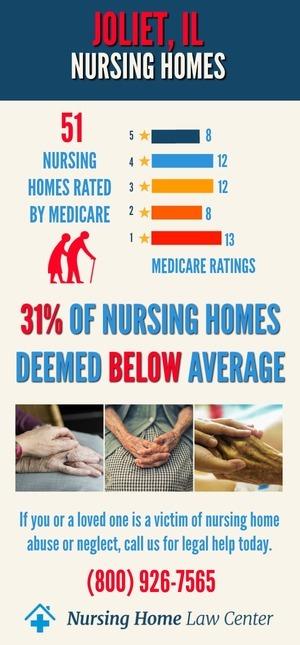The Nursing Home Law Center is committed to providing the legal resources necessary to hold negligent facilities accountable.
Joliet Nursing Home Abuse Lawyer

Licensed in Illinois
Nursing home abuse is a critical issue that can have devastating consequences for both the victims and their families. If you or a loved one has suffered from nursing home abuse, it’s important to seek legal help from an experienced Joliet nursing home abuse lawyer.
Why Hire Nursing Home Law Center
At Nursing Home Law Center, we are dedicated to helping victims of nursing home abuse secure justice and fair compensation. Our skilled legal team has a long history of successfully handling abuse cases with care and achieving meaningful settlements and verdicts for our clients.
We thoroughly investigate every case to ensure that all aspects of the abuse, such as medical expenses, emotional harm, and other damages, are fully addressed. With our extensive knowledge of nursing home abuse claims, we manage the legal process efficiently and work relentlessly to safeguard your rights.
We offer compassionate and clear guidance throughout the case, ensuring you and your loved ones stay informed, protected, and supported at every stage.
Types of Cases Handled by Our Joliet Nursing Home Abuse Lawyers

Nursing home abuse can take many forms, each of which is harmful to the well-being of nursing home residents. Abuse involves any act or failure to act that leads to harm or distress. Below are the types of nursing home abuse cases our Joliet nursing home abuse attorneys handle:
Physical Abuse
Physical abuse includes any intentional use of force that causes bodily harm. This assault can range from hitting, pushing, or kicking to using unnecessary restraints. Residents subjected to physical abuse may suffer unexplained injuries such as bruises, cuts, or broken bones.
Mental and Emotional Abuse
Emotional abuse, also known as mental abuse, involves verbal assaults, threats, intimidation, or isolation. It can result in severe psychological trauma, leading to depression, anxiety, and withdrawal from activities.
Sexual Abuse
Sexual abuse is any non-consensual sexual contact with a nursing home resident. This form of abuse can be especially traumatic, particularly for elderly or vulnerable residents who may not be able to communicate the abuse effectively.
Medical Malpractice
Nursing home negligence in providing adequate care can lead to serious health issues. Medical malpractice cases include bed sores, medication errors, and failure to treat existing conditions properly.
Negligence
Neglect in assisted living facilities often involves failing to meet residents’ basic needs, such as maintaining hygiene, providing proper nutrition, or ensuring hydration. Medical negligence can also lead to worsening health conditions or elopement, where residents wander off unsupervised.
Financial Abuse
Financial exploitation occurs when someone unlawfully takes control of a resident’s finances. This can involve stealing personal possessions, manipulating bank accounts, or coercing residents into changing legal documents.
Wrongful Death
In the most tragic cases, nursing home abuse can result in the death of a resident. When this happens, a family member or legal guardian may file a wrongful death lawsuit to seek justice and compensation for their loved one’s untimely death.
Understanding Your Legal Rights
Under federal and state laws, nursing home residents are entitled to specific protections.
The Nursing Home Reform Act of 1987 guarantees that residents receive quality care and adequate medical attention and are free from abuse, neglect, and mistreatment.
In Illinois, state-specific regulations and oversight from the Illinois Department of Public Health further protect residents’ rights in long-term care facilities.
Eligibility to File an Elder Abuse Claim
Nursing home residents who have directly suffered abuse or neglect can file a nursing home abuse claim. Family members or guardians can take legal action for residents who cannot advocate for themselves.
If a resident has passed away due to nursing home abuse or neglect, their estate may file a wrongful death claim.
Liability in Nursing Home Neglect and Abuse Cases
Liability often depends on the specific circumstances of the case. However, multiple parties can be held responsible for abuse in an assisted living facility.
- Caregivers or nursing home staff members
- The facility itself
- Third-party contractors or other external service providers
- Other residents
How Our Joliet Nursing Home Abuse Attorneys Can Help
At Nursing Home Law Center, we are experienced in handling a wide range of nursing home negligence lawsuits. Our legal team is dedicated to protecting the rights of nursing home patients and ensuring they receive the fair compensation they deserve. Here’s how we can assist you:
- Free Case Evaluation: We offer a free initial consultation to discuss your case, evaluate your legal options, and determine the best course of action.
- Case Investigation: Our attorneys will thoroughly investigate the abuse or neglect claims, gathering crucial evidence such as medical records, witness testimonies, and facility reports to build a strong case.
- Filing the Claim: We handle all aspects of filing your nursing home negligence lawsuit, ensuring that your case complies with the applicable laws and regulations.
- Settlement Negotiation: Our legal team works to secure a fair settlement, covering medical expenses, emotional distress, and other damages associated with the abuse.
- Trial Representation: Our experienced attorneys are prepared to take your case to trial and fight for justice if a settlement cannot be reached.
Common Signs of Elder Abuse in Nursing Homes
In Joliet, Illinois, there are 103 Medicare-approved nursing homes. Of these, 56 facilities (54%) have an overall score of below or much below average. Specifically, 47 nursing homes (46%) fall short in health inspections, and 75 facilities (73%) have inadequate staffing levels. Additionally, 40 nursing homes (39%) rated poorly in quality measures. [1]
The worst-rated nursing homes in Joliet include:
| Alden Estates of Naperville | Alden Estates of Orland Park |
| Aliya of Oak Lawn | Aliya of Palos Park |
| Aliya on 87th | Aperion Care Oak Lawn |
| Aperion Care Wilmington | Arcadia Care Morris |
| Avantara Evergreen Park | Avantara Palos Heights |
| Belhaven Nursing & Rehab Center | Briar Place Nursing |
| Bria of Chicago Heights | Bria of Westmont |
| Burbank Rehabilitation Center | Chateau Nrsg & Rehab Center |
| Chicago Ridge Snf | Crestwood Rehabilitation Ctr |
| Crestwood Terrace | Downers Grove Rehab & Nursing |
| Elevate Care Country Club Hill | Generations at Applewood |
| Heather Health Care Center | Hickory Vlg Nrsg & Rhb |
| Landmark of Richton Park Rehab & Nsg Ctr | Meadowbrook Manor – Naperville |
| Oak Lawn Respiratory & Rehab | Parc Joliet |
| Park Pointe Healthcare & Rehab | Pearl of Hinsdale |
| Pearl of Joliet | Pearl of Naperville |
| Pearl of Orchard Valley | Prairie Oasis |
| Renwick Nursing and Rehab | South Suburban Rehab Center |
| West Chicago Terrace | Westmont Manor Hlth & Rhb |
It’s important to be aware of the warning signs of abuse, as many nursing home residents may be unable or afraid to report it. Common indicators include:
- Unexplained injuries like bruises, cuts, or fractures
- Sudden weight loss
- Bed sores or pressure ulcers
- Withdrawal from social activities or changes in behavior
- Poor hygiene or unsanitary living conditions
What to Do If You Suspect Nursing Home Abuse
If you suspect nursing home abuse, take immediate action to protect your loved one. Here are the steps you should follow:
- Call 911 if the resident is in immediate danger.
- Report the abuse to the nursing home administrator or management.
- File a formal complaint with your local Ombudsman’s office, which advocates for the rights of nursing home residents.
- Contact a Joliet nursing home abuse lawyer to explore your legal options and pursue justice.
Damages You Can Recover Through a Nursing Home Abuse Claim
Victims of nursing home abuse and their families may be entitled to various types of damages based on the specifics of the case.
- Economic Damages: These are intended to cover the financial losses directly resulting from the abuse. Examples include medical expenses, relocation costs, and lost financial support.
- Non-economic Damages: These cover non-financial losses that affect the victim’s quality of life. Examples include pain and suffering, loss of enjoyment of life, or emotional trauma.
- Punitive Damages: These are awarded in cases of particularly egregious abuse. Punitive damages are designed to punish the responsible parties and deter similar behavior in the future.
The Cost of Hiring a Joliet Nursing Home Abuse Lawyer
At Nursing Home Law Center, we operate on a contingency fee basis, meaning you don’t pay any upfront costs. You only pay if we successfully recover compensation for your case, allowing you to seek justice without financial worry.
You Have Limited Time to Take Legal Action in Joliet
Under Illinois law, the statute of limitations for filing personal injury cases is typically two years from the date the abuse or neglect took place or from when it was discovered.
If you believe your loved one has suffered elder abuse in a Joliet nursing home, it’s crucial to take action promptly. Failing to file a claim within this time frame can significantly reduce your ability to seek justice and obtain maximum compensation for the harm caused.
Contact a Joliet Nursing Home Abuse Attorney Today!
If you or a loved one has suffered nursing home abuse, our Illinois nursing home lawyers at Nursing Home Law Center is ready to help. We have the knowledge and dedication to hold nursing homes accountable and secure the compensation your loved one deserves. Contact us today for a free consultation with an Illinois nursing home abuse attorney, and let us fight to ensure justice for your family.
Call us at (800) 926-7565 or fill out our contact form.
References: [1] Medicare
Illinois Nursing Home Abuse Lawyers
- Aurora Nursing Home Abuse Lawyer
- Bloomington Nursing Home Abuse Lawyer
- Champaign Nursing Home Abuse Lawyer
- Chicago Nursing Home Abuse Lawyer
- Cicero Nursing Home Abuse Lawyer
- Elgin Nursing Home Abuse Lawyer
- Joliet Nursing Home Abuse Lawyer
- Naperville Nursing Home Abuse Lawyer
- Peoria Nursing Home Abuse Lawyer
- Rockford Nursing Home Abuse Lawyer
- Schaumburg Nursing Home Abuse Lawyer
- Springfield Nursing Home Abuse Lawyer
- Waukegan Nursing Home Abuse Lawyer

